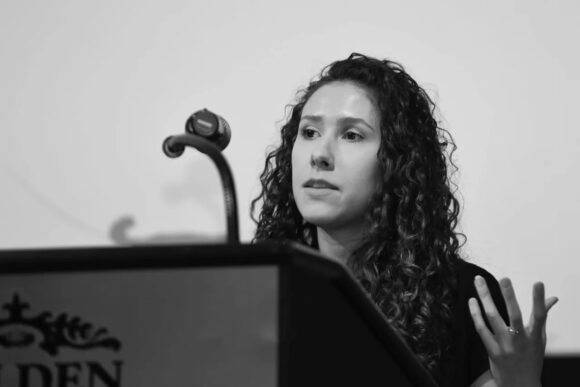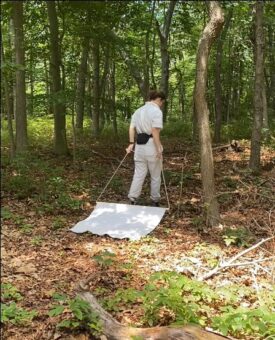
Zoe Narvaez presenting statewide tick-borne pathogen surveillance results at the 2024 meeting of the New Jersey Mosquito Control Association, Atlantic City, NJ.
Zoe Narvaez, a PhD candidate in Entomology and a National Science Foundation Graduate Research Fellow, was awarded a travel grant by the Northeastern Mosquito Control Association (NMCA) to present the findings of her dissertation at their 2024 annual meeting in Plymouth, Massachusetts this month. In late 2023, the NMCA awarded Narvaez the Jobbins Scholarship, which honors outstanding research in vector biology.
For her doctoral dissertation, Narvaez has been researching the ecology of tick-borne diseases in the “fragmented” forests of New Jersey. Her findings reveal another layer to the folly of urban sprawl – that the rich patchwork of undisturbed forests and preserves, cherished as respites from the downsides of urban and suburban life, may be incubators for tick-borne pathogens like those causing Lyme disease and Powassan virus.
“NJ has the highest density of preserved parkland in the contiguous U.S. We have so many small, isolated urban forests – tick habitats adjacent to where we live and work,” said Narvaez. “There’s a growing body of evidence that when you fragment forests and habitats, there can be changes in the abundance of ticks and tick-borne pathogens. Some worry that human development may be driving more intense tick-borne disease.”

An undergraduate entomology researcher collects host-seeking ticks from dense foliage through the “flagging” method at Cheesequake State Park, July 2023.
Narvaez also presented this work at the November 2024 meeting of the Entomological Society of America in Phoenix, AZ where she won first place in the “Ecology, Vector Biology, and Management” graduate competition section for the second year in a row.
“I’ve always been interested in diseases transmitted by bugs,” said Narvaez, whose work in vector biology started when she was in high school working in mosquito control, helping to kill larvae. “The diseases are really complex and have to be very clever and insidious to evade the immune systems of both the bug and the animal.”
Fortuitously, her employer from high school introduced her to her PhD advisor at Rutgers. Narvaez studied public health at the University of Oklahoma as an undergraduate and plans to complete her PhD in the spring of 2025.

